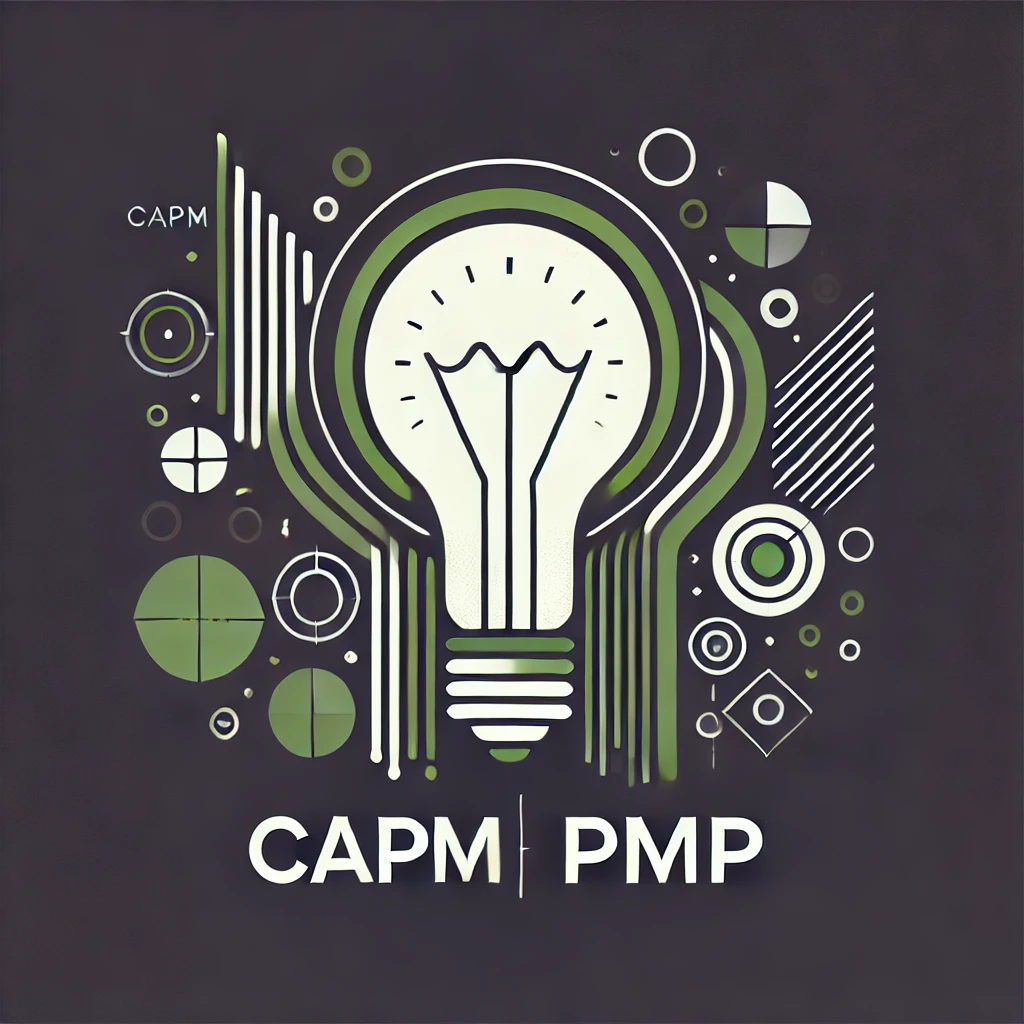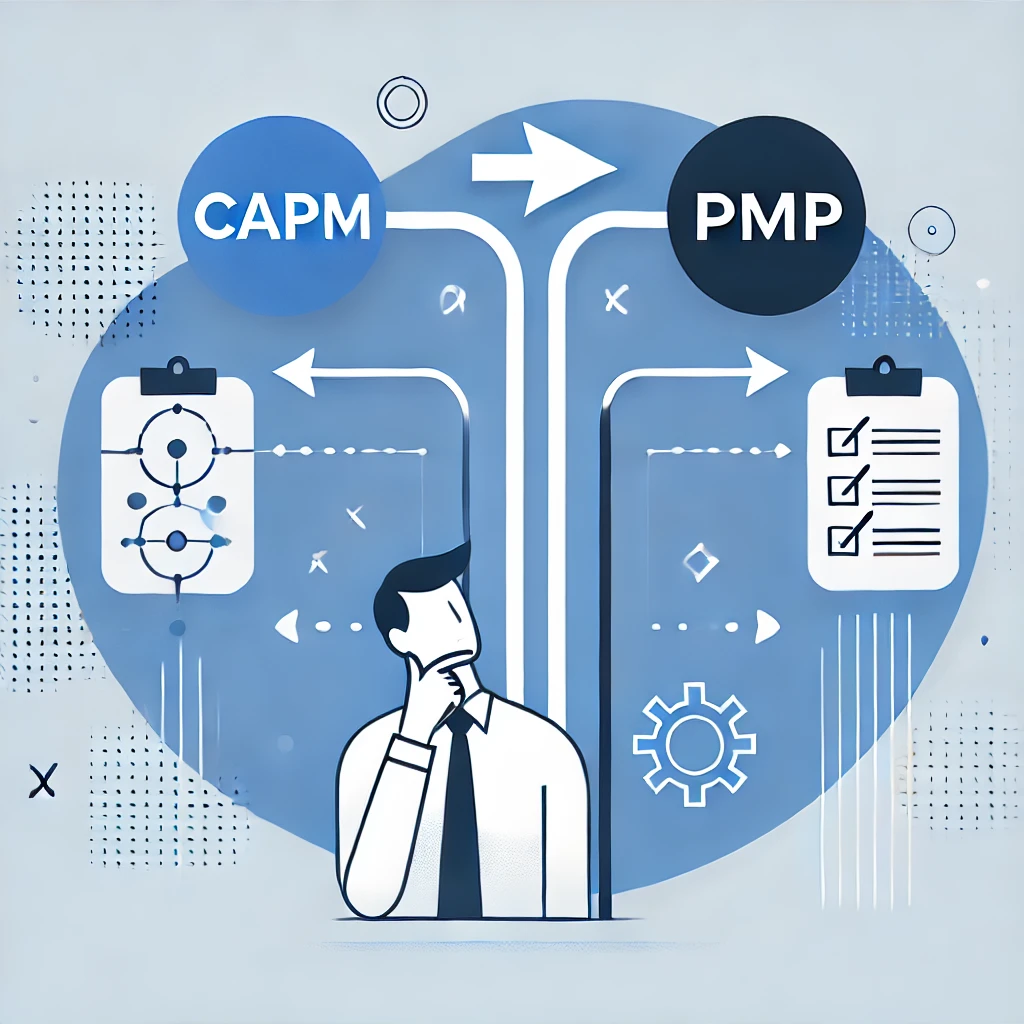In the ever-evolving field of project management, obtaining the right certification can be a game-changer for your career. Certifications not only validate your skills and knowledge but also open doors to new opportunities and professional growth.
Among the various project management certifications available, the Certified Associate in Project Management (CAPM) and the Project Management Professional (PMP) are two of the most sought-after credentials.
Choosing the right certification depends on various factors, including your career goals, level of experience, and the specific requirements of your industry.
Whether you are just starting out in project management or looking to advance your career to the next level, understanding the differences between CAPM and PMP can help you make an informed decision.
CAPM vs. PMP
| Criteria | CAPM (Certified Associate in Project Management) | PMP (Project Management Professional) |
|---|---|---|
| Certification Authority | PMI (Project Management Institute) | PMI (Project Management Institute) |
| Target Audience | Entry-level professionals, career changers | Experienced project managers |
| Educational Prerequisites | Secondary degree (high school diploma, associate’s degree, or global equivalent) | Secondary degree or four-year degree (or global equivalent) |
| Experience Requirements | None | Secondary degree: 7,500 hours leading projects and 35 hours of project management education <br> Four-year degree: 4,500 hours leading projects and 35 hours of project management education |
| Exam Structure | 150 multiple-choice questions | 180 questions (multiple-choice, multiple responses, matching, hotspot, limited fill-in-the-blank) |
| Exam Duration | 3 hours | 230 minutes with two 10-minute breaks |
| Content Outline | Project management fundamentals based on the PMBOK Guide | People (42%), Process (50%), Business Environment (8%) |
| Exam Fee (PMI Members) | $225 | $405 |
| Exam Fee (Non-Members) | $300 | $555 |
| Renewal Requirements | Retake the exam every 5 years | Earn 60 PDUs every 3 years |
| Renewal Cost (PMI Members) | $225 | $60 |
| Renewal Cost (Non-Members) | $300 | $150 |
| Career Impact | Entry-level job opportunities, foundational knowledge, path to PMP | Advanced job opportunities, higher salary potential, global recognition |
| Commitment to Professional Growth | Demonstrates initial commitment, builds confidence | Demonstrates advanced commitment, continuous learning through PDUs |
| Networking Opportunities | Access to PMI resources and community | Extensive networking opportunities within PMI’s global network |
| Potential Salary Increase | Moderate | Significant |
- Certification Authority: Both CAPM and PMP are administered by PMI, ensuring global recognition and high standards
- Target Audience: CAPM is ideal for entry-level professionals and career changers, while PMP is geared towards experienced project managers
- Eligibility Requirements: CAPM requires a secondary degree and no prior project management experience, whereas PMP requires significant project management experience and education
- Exam Structure: CAPM features 150 multiple-choice questions over 3 hours, while PMP includes 180 diverse question types over 230 minutes with breaks
- Costs: CAPM is more affordable, with lower exam and renewal fees compared to PMP
- Renewal: CAPM requires retaking the exam every 5 years, while PMP needs 60 PDUs every three years
- Career Impact: CAPM provides foundational knowledge and entry-level job opportunities, while PMP offers advanced roles, higher salary potential, and extensive networking opportunities
- Professional Growth: Both certifications demonstrate commitment to the project management field, with PMP requiring continuous professional development.
Overview of CAPM and PMP

CAPM (Certified Associate in Project Management)
The Certified Associate in Project Management (CAPM) is an entry-level certification offered by the Project Management Institute (PMI). It is designed for individuals who are new to project management or those who wish to demonstrate their understanding of fundamental project management principles and terminology.
The CAPM certification is ideal for recent graduates, those looking to switch careers, or professionals who want to add project management skills to their existing roles.
- Definition and Purpose: The CAPM certification signifies that an individual has a solid understanding of the foundational knowledge, processes, and terminology defined in the PMBOK (Project Management Body of Knowledge) Guide. It demonstrates commitment to learning and mastering project management skills.
- Target Audience: CAPM is aimed at aspiring project managers, team members, and professionals at the early stages of their project management careers. It is also suitable for those looking to enhance their project management capabilities in roles that are not primarily project management-focused.
- Certification Authority: The CAPM certification is administered by the Project Management Institute (PMI), a globally recognized organization dedicated to advancing the project management profession.
PMP (Project Management Professional)
The Project Management Professional (PMP) certification is a highly recognized and respected credential for experienced project managers. PMI also offers it and considers it the gold standard in project management certifications.
The PMP certification validates a professional’s ability to lead and direct projects, demonstrating experience, education, and competency in project management.
- Definition and Purpose: The PMP certification indicates that an individual has extensive project management experience and knowledge, including leadership skills, the ability to manage project teams, and the capacity to achieve project goals. It covers advanced project management concepts and practices.
- Target Audience: The PMP is geared towards experienced project managers with a proven track record of managing and directing projects. It suits professionals seeking to advance their careers, take on more significant project responsibilities, or move into leadership positions.
- Certification Authority: Like CAPM, the PMP certification is administered by the Project Management Institute (PMI), which ensures the certification maintains its high standards and global recognition.
Eligibility Requirements

CAPM Eligibility
The Certified Associate in Project Management (CAPM) certification is designed to accommodate those who are at the beginning of their project management career. The eligibility criteria reflect this focus on accessibility for newcomers and those seeking to establish a foundation in project management.
- Educational Prerequisites: Candidates must have a secondary degree (high school diploma, associate’s degree, or the global equivalent) to be eligible for the CAPM certification.
- Project Management Education Requirements: Candidates must also complete 23 hours of project management education before they sit for the exam. This education requirement ensures that candidates understand project management principles and practices as outlined in the PMBOK Guide.
These requirements make the CAPM certification accessible to a wide range of individuals, including those who may not yet have extensive professional experience in project management but are eager to learn and grow in this field.
PMP Eligibility
The Project Management Professional (PMP) certification is aimed at experienced project managers who have demonstrated their ability to lead and direct projects. As such, the eligibility requirements for PMP are more stringent and comprehensive than those for CAPM.
- Educational Prerequisites:
- With a Secondary Degree: Candidates must have a high school diploma, associate’s degree, or the global equivalent.
- With a Four-Year Degree: Candidates must have a bachelor’s degree or the global equivalent.
- Project Management Experience Requirements:
- With a Secondary Degree: Candidates need to have at least 7,500 hours of leading and directing projects and 35 hours of project management education.
- With a Four-Year Degree: Candidates must have at least 4,500 hours of leading and directing projects and 35 hours of project management education.
These requirements ensure that PMP candidates have significant practical experience and a solid educational background in project management.
The experience requirement is particularly important, as it demonstrates that candidates have applied their knowledge in real-world project environments, preparing them for the complexities and challenges of managing projects professionally.
Exam Structure and Content

CAPM Exam
The CAPM (Certified Associate in Project Management) exam tests a candidate’s knowledge of project management’s fundamental principles and concepts. Its structure and content are straightforward, reflecting its focus on foundational knowledge.
- Number of Questions: The CAPM exam consists of 150 multiple-choice questions.
- Types of Questions: All questions are multiple-choice, each with one correct answer out of four possible options.
- Duration: Candidates have three hours to complete the exam.
- Content Outline: The exam is based on the PMBOK (Project Management Body of Knowledge) Guide and covers the following domains:
- Introduction to Project Management: Understanding the basics of project management and the role of a project manager.
- Project Environment: Knowledge of the various factors that influence a project, including organizational structures and enterprise environmental factors.
- Role of the Project Manager: Responsibilities and competencies required for a project manager.
- Project Integration Management: Processes and activities needed to identify, define, combine, unify, and coordinate project activities.
- Project Scope Management: Ensuring that the project includes all the work required, and only the work required, to complete the project successfully.
- Project Schedule Management: Processes necessary to manage the project’s timely completion.
- Project Cost Management: Planning, estimating, budgeting, financing, funding, managing, and controlling costs.
- Project Quality Management: Policies, objectives, and responsibilities so that the project will satisfy the needs for which it was undertaken.
- Project Resource Management: Identifying, acquiring, and managing resources.
- Project Communication Management: Ensuring timely and appropriate planning, collection, creation, distribution, storage, retrieval, management, control, monitoring, and disposition of project information.
- Project Risk Management: Identifying, analyzing, and responding to project risks.
- Project Procurement Management: Procuring goods and services from external sources.
- Project Stakeholder Management: Identifying and managing project stakeholders.
PMP Exam
The PMP (Project Management Professional) exam is more rigorous and comprehensive, reflecting its status as a certification for experienced project managers. The exam assesses a candidate’s ability to apply project management principles and methodologies in real-world situations.
- Number of Questions: The PMP exam consists of 180 questions.
- Types of Questions: The questions include multiple-choice, multiple responses, matching, hotspot, and limited fill-in-the-blank questions.
- Duration: Candidates have 230 minutes to complete the exam, with two 10-minute breaks during the exam.
- Content Outline: The exam content is divided into three domains, each covering different aspects of project management:
- People (42% of the exam): Emphasizes the skills and activities associated with effectively leading a project team, including managing conflict, leading and motivating a team, and ensuring team members are properly trained and coached.
- Process (50% of the exam): Focuses on the technical aspects of project management, including managing scope, schedule, cost, quality, and risks. This domain covers the traditional project management practices outlined in the PMBOK Guide.
- Business Environment (8% of the exam): Examines the connection between projects and organizational strategy, including compliance, business value, and change management.
The PMP exam tests knowledge of project management methodologies and evaluates a candidate’s ability to apply that knowledge in practical scenarios. Thus, it ensures that certified professionals are well-equipped to handle complex projects and lead teams effectively.
Cost and Renewal

CAPM Cost and Renewal
The cost and renewal requirements for the Certified Associate in Project Management (CAPM) certification are structured to ensure accessibility and ongoing professional development for entry-level project managers.
- Exam Fee:
- PMI Members: The exam fee for PMI members is $225.
- Non-Members: The exam fee for non-members is $300.
- Membership Advantage: Becoming a PMI member before applying for the exam can be cost-effective, as it offers a discounted exam fee and access to additional resources, such as the PMBOK Guide and other study materials.
- Renewal Requirements:
- Validity Period: The CAPM certification is valid for five years.
- Renewal Process: To renew the CAPM certification, candidates must retake the CAPM exam before the end of the five-year certification cycle.
- Cost for Renewal: The renewal cost is the same as the initial exam fee. PMI members pay $225, and non-members pay $300 for the renewal exam.
The CAPM renewal process ensures that certified individuals maintain their knowledge of project management fundamentals and stay updated with any changes or updates in the PMBOK Guide.
PMP Cost and Renewal
The cost and renewal requirements for the Project Management Professional (PMP) certification reflect its advanced level and the ongoing commitment required to maintain the certification.
- Exam Fee:
- PMI Members: The exam fee for PMI members is $405.
- Non-Members: The exam fee for non-members is $555.
- Membership Advantage: Like the CAPM, PMI membership offers significant benefits for PMP candidates, including a discounted exam fee and access to extensive resources that support exam preparation and professional development.
- Renewal Requirements:
- Validity Period: The PMP certification is valid for three years.
- Renewal Process: To renew the PMP certification, candidates must earn 60 Professional Development Units (PDUs) within the three-year certification cycle.
- Professional Development Units (PDUs): PDUs are earned through various professional development activities such as participating in courses, attending conferences, volunteering, and working in project management roles. PMI provides a detailed framework for earning and reporting PDUs.
- Cost for Renewal: The renewal fee for PMI members is $60, and for non-members, it is $150.
The PMP renewal process ensures that certified professionals continue their education and actively engage in the project management community. This continuous learning approach helps PMPs stay current with industry trends, methodologies, and best practices, thereby maintaining the high standards associated with the PMP credential.
Career Impact and Benefits

CAPM Benefits
The Certified Associate in Project Management (CAPM) certification is an excellent starting point for individuals who are new to project management. It provides numerous benefits that can significantly impact one’s career.
- Entry-Level Job Opportunities: The CAPM certification is designed for those beginning their project management careers. It opens doors to entry-level positions such as project coordinator, junior project manager, and project analyst. These roles provide valuable experience and are stepping stones to more advanced positions.
- Foundation in Project Management: CAPM certifies that you have a solid understanding of project management’s fundamental concepts and terminology. This knowledge base is essential for anyone looking to pursue a career in this field.
- Commitment to Professional Growth: Earning a CAPM demonstrates a commitment to your career and professional development. It shows employers that you are serious about learning and growing in the project management field.
- Building Confidence: Studying for and obtaining the CAPM certification can boost your confidence in your project management abilities. This confidence can translate into better job performance and a stronger professional presence.
- Pathway to Advanced Certifications: CAPM is often a stepping stone to more advanced certifications like the PMP. It provides a foundational knowledge that can make pursuing the PMP certification more manageable and less daunting.
PMP Benefits
The Project Management Professional (PMP) certification is recognized globally as a premier project management credential. It offers significant career benefits and can greatly enhance professional opportunities and growth.
- Higher-Level Job Opportunities: The PMP certification qualifies you for more advanced project management roles, such as project manager, program manager, and portfolio manager. These positions often come with greater responsibilities and higher salaries.
- Recognition and Credibility: PMP is one of the most respected certifications in the project management field. It is recognized worldwide and serves as a mark of excellence, signaling to employers and peers that you have the skills and experience to manage complex projects successfully.
- Potential Salary Increase: PMP-certified professionals often command higher salaries compared to their non-certified counterparts. According to PMI’s salary survey, PMP holders can earn up to 20% more than those without the certification.
- Networking Opportunities: PMI offers numerous opportunities for PMP-certified professionals to connect with a global network of project managers. This networking can lead to job opportunities, professional advice, and collaboration on projects.
- Enhanced Skills and Knowledge: Preparing for the PMP exam deepens your understanding of project management principles, tools, and techniques. This knowledge can improve your effectiveness in managing projects and leading teams.
- Career Advancement: PMP certification is often a prerequisite for senior-level project management positions. It can help you advance your career more quickly and take on leadership roles within your organization.
Which Certification is Right for You?
Choosing the right certification between CAPM (Certified Associate in Project Management) and PMP (Project Management Professional) depends on several factors, including your current career stage, experience, and long-term professional goals.
Factors to Consider
- Career Stage and Experience Level:
- CAPM: Ideal for individuals who are new to project management or have limited experience in the field. It serves as an entry-level certification that helps build foundational knowledge and skills.
- PMP: Suited for professionals with substantial project management experience. If you have been leading projects and have several years of experience, PMP will validate your advanced skills and knowledge.
- Long-Term Career Goals:
- CAPM: If you aim to establish yourself in the field of project management and gradually work your way up, CAPM is a great starting point. It can also be a stepping stone towards obtaining PMP certification in the future.
- PMP: For those looking to accelerate their career, take on leadership roles, or command higher salaries, PMP is the preferred certification. It is recognized globally and often required for senior project management positions.
- Current Job Requirements and Employer Preferences:
- CAPM: Some employers may prefer or require CAPM certification for entry-level project management positions. It demonstrates your commitment and foundational understanding of project management.
- PMP: Many organizations require PMP certification for higher-level project management roles. It signifies that you have the expertise and experience to manage complex projects and lead teams effectively.
- Time and Financial Investment:
- CAPM: The CAPM certification generally requires less time and financial investment compared to PMP. The eligibility criteria are more accessible, and the exam fee is lower.
- PMP: Obtaining PMP certification requires a significant investment of time and money. The eligibility criteria include substantial project management experience and education, and the exam fee is higher. However, the return on investment can be substantial in terms of career advancement and salary increase.
Scenarios
- Ideal Candidates for CAPM:
- New Graduates: Individuals who have recently graduated and are looking to start a career in project management.
- Career Changers: Professionals transitioning from another field into project management.
- Entry-Level Professionals: Those with limited project management experience seeking to establish their credentials and build a solid foundation.
- Ideal Candidates for PMP:
- Experienced Project Managers: Professionals with several years of project management experience who want to validate their skills and knowledge.
- Career Advancers: Individuals aiming for senior project management roles or leadership positions within their organization.
- Consultants and Contractors: Professionals working in consulting or contracting who need a globally recognized certification to enhance their credibility and marketability.
Conclusion
Deciding between CAPM and PMP ultimately depends on where you are in your career and where you want to go. If you are just starting out or have limited experience, CAPM provides a solid foundation and a pathway into the project management profession.
On the other hand, if you have substantial experience and are looking to advance your career, PMP offers significant benefits, including higher earning potential and greater job opportunities.
Evaluate your current situation, career goals, and the requirements of your desired job roles. Whichever certification you choose, both CAPM and PMP will enhance your professional standing and open up new opportunities in the field of project management.